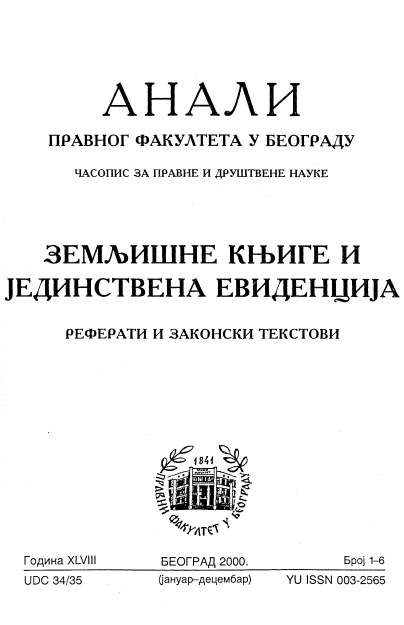СИСТЕМ ЗЕМЉИШНИХ КЊИГА И ЈЕДИНСТВЕНЕ ЕВИДЕНЦИЈЕ (Аргументи за и против - са посебним освртом на поступак уписа права и правне лекове)
LAND REGISTER AND UNIFIED RECORDING SYSTEM
Author(s): Leposava KaramarkovićSubject(s): Civil Law
Published by: Правни факултет Универзитета у Београду
Keywords: Unified records; Land registers; Title recording; Legal remedies
Summary/Abstract: The unified recording system has been introduced due to the current unsatisfactory situation, following a broad expert debate. The previous situation was not satisfactory for a variety of reasons: land registers exist in just a little over 20 percent of cadastral municipalities, they have not been updated, courts have relied more on cadastral surveys, the updating of cadastral records has not been accompanied by the updating of land registers. Significant changes regarding the recording process include a possibility of possession recording and the introducing of the principle of unified records and ex oficio registration. The recording procedure is different in the period of establishing and the period of maintaining the unified record. In the period of its establishing all the entries are temporary and are made in conformity with land registers. Where such registers do not exist, the entries are made upon the delivery of a deed for recording, or just a possessory title is recorded. Recording in the establishing period is carried out in the same way it is performed in land registers, with only one difference based on the introducing of ex oficio registration. Legal remedies provided by the land recording system include appeal, review and action for cancellation, while the unified recording system provides for different legal remedies in the establishing period and in the period of maintaining the unified records. In the establishing period, objection and appeal are stipulated, while administrative proceeding is ruled out. On the other hand, it is possible to file a civil action as a court proceeding. Extraordinary legal remedies and action for cancellation are not possible at this stage. In the period of maintaining the records, only an appeal on decision is provided for, without a possibility of instituting administrative proceedings, while possible extraordinary legal remedies provided by general administrative procedure include reopening of the proceedings, annulment and revision of the judgment with the approval or at the request of a party, and declaring the decision null and void. Action for cancellation is possible at this stage.
Journal: Анали Правног факултета у Београду
- Issue Year: 48/2000
- Issue No: 1-6
- Page Range: 100-120
- Page Count: 21
- Language: Serbian

